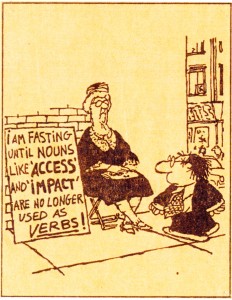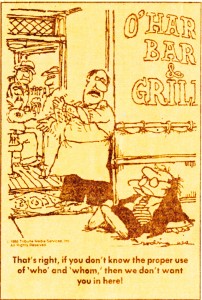Archive for Language
Did A Human Write This?
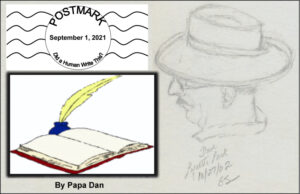
Last Fall
New York Times Columnist Farhad Manjoo
wrote a piece called:
Did a Human Write This?
Well?
Click here for a PDF of this post: Did_A_Human_Write_This_SEPT1_FINAL
= = = = = = = = = = = = = = = = = = = = = = = = = = = = = = = = = = = = = = = =
In the Fall of 2020, a columnist named Farhad Manjoo reported in The New York Times something that many of us have come to realize — that machines have been gaining in their ability to write for a long time now; and, he says, “they are getting terrifyingly good at it.” Many people and businesses have greeted this news with appreciation, for it can enhance our ability to do our work in many useful ways. So, why does Mr. Manjoo use the phrase “terrifyingly good” to describe this phenomenon? … (pause here a moment for internal reflection) … In another sentence, he nudges a bit closer to our real, human, concern — “I’ve never really worried that a computer might take my job because it’s never seemed remotely possible.” However, he goes on to introduce us to a relatively new piece of software, a “language model” called GPT-3 that seems to contradict this reassuring sentence. Apparently, you can “program” this software language model by providing a writing sample. It claims to be able to match the pattern and “learn to write” in the same style as a human writer would.
Hmmmmmmmmmmmm …
So, the subject of Mr. Manjoo’s piece, “Did A Human Write This?”, is intriguing in itself;
BUT here, in THIS piece of writing, I am asking a question that intrigues me much more:
–> “How Can You Tell?” <—
In other words, if we claim that we can tell that a human and not a computer wrote something, what is it about the writing that would enable us to make that distinction?
Let’s explore this question.
Human Attributes: “The Usual”
Over centuries, humans have identified a set of attributes that we claim for ourselves as distinctly human. Some of these capabilities are fundamentally cognitive, like these two:
• The ability to recognize and remember a set of sequential stimuli and complex patterns
• A high-level ability to generate and comprehend complex language.
Computer programmers and software developers attest that computers can certainly do these two things in ways that sufficiently imitate human performance. Even if that’s true, I don’t think these are the determining factors in recognizing a human source for a piece of writing.
There are other recognized human attributes that are much more closely associated with what we think of as our “humanity,” like these two examples:
• empathy — the ability to understand and share the feelings of others
• the ability to recognize and apply patterns of moral and ethical decision-making.
So, I ask: can these two examples of “humanistic” attributes be simulated or credibly imitated — heck, independently performed — by computer systems in ways that we would recognize? Can the resulting writings sound human? The makers of modern “language models” claim that they can. You and I might claim that we can tell whether attempts are genuinely human or computer-generated imitations. BUT, that would just lead to an argument between us and software engineers; and we might not win that argument. Once again, I don’t whether those are the determining factors either. So, let’s set that aside for a moment. So, let’s go back to Mr. Manjoo’s question in the New York Times: if computers could possess those abilities, does that mean that computers can take jobs being done today by our human writers? Can computers make human writers obsolete? I’ll give you my answer.
My Answer: I’m saying “No”
There are formulations I have seen in the work of human writers over centuries (and in my own writing) that demonstrate distinctly human patterns of thought. I insist that these patterns are evidence of our human-ness that we can all recognize in our own behavior, and in the behavior of others, as distinctly human. They are NOT, I insist, patterns that computers would generate on their own. Even if they could, after looking at some examples, one can’t help but ask, “Why would a computer want to intentionally imitate these human patterns of thought and expression? (It’s not an unreasonable question to ask why humans would want to exhibit these patterns, but we can leave that for another time.) What are they? Let’s examine three examples of traits that human writers have attributed to their human characters, both in fiction and nonfiction:
• The propensity for lapses in memory, and patterns of incongruity
• The potential of individuals to hold opposing and contradictory views simultaneously
• The habit of some individuals to act in ways that are contrary to their own best interests.
Well, now maybe we’re getting closer to answering our question. These are human behaviors that appear repeatedly in writing about human characters. I am not convinced that writing generated entirely by computer software would or could feature these behaviors unless guided by an interfering human. On further reflection, even if they could, I don’t think these are the most important features that could answer the question: can computers make human writers obsolete?
Below are what I claim are the three principal indictors that matter: human attributes that writers portray in their characters that exhibit the most common elements of our humanity. Without these examples (and I’m sure there are others), much of our literature would be deficient:
• Digression, also known as ‘stream of consciousness’ thinking
• Silliness
• Illogic
Perhaps there are other examples, but let’s look at these three.
The Three Human Indicators: What do we see in Human Storytelling?
ONE: Digression: A lot of great American literature is built, at least in part, by this feature.
“… but as I was saying when … “ or “let’s set that aside for a moment”
Literature is full of examples of “stream of consciousness” storytelling in which the “voice” of the story speaks to the reader directly and digresses from the telling to share seemingly random thoughts along the way — Jack London (“To Build a Fire”), Ambrose Bierce (“Occurrence at Owl Creek Bridge”), Edgar Allen Poe (“The Tell-Tale Heart”), Mark Twain (“Speech On The Weather” and many others), Kate Chopin (“The Night Came Slowly”), are impressive examples.
It is interesting to me that some of the best examples of digression are not just found in stories, but also poems. In one of my favorite pieces of distinctly human literature, Robert Frost uses digression to capture an important element of imaginative reminiscence. In his poem “Birches,” Frost imagines a boy bending the branches of his father’s birch trees. He retells an entire childhood scenario of the boy climbing the trees in a particularly stylish way while doing his chores — “as he went out and in to fetch the cows.” A boy’s entire world view is shaped by this imaginary process. BUT then we discover that it’s all a digression. We hear that the speaker in the poem IS this boy, and then, as the poem brings us back to reality, it turns out that the ice storm is what bends the branches into their particular shape; but he would rather imagine something else:
But I was going to say when Truth broke in
With all her matter-of-fact about the ice-storm
I should prefer to have some boy bend them
As he went out and in to fetch the cows—
For Robert Frost, in his own recollection … or maybe in his imagination … he IS that boy:
So was I once myself a swinger of birches.
And so I dream of going back to be.
It’s when I’m weary of considerations,
He goes on to describe what it means to be “weary of considerations.” His imagination allows him to escape “considerations,” “rise toward heaven,” but return to earth because:
Earth’s the right place for love:
I don’t know where it’s likely to go better.
So, reality wins out over imagination … but … he concedes that the life of his imagination is not a bad place to visit:
One could do worse than be a swinger of birches.
But … I digress (you knew that was coming, eh?)
To return to Mr. Manjoo’s question — No, a computer could not have used such a digression from reality to imagination and then back again to reality to convey important messages about being human. Only a human could do that.
Below is the full text of Frost’s poem (you were hoping for that, eh?) It’s chock full of examples that confirm that no computer program imaginable could tell a story that takes you inside the human mind and heart the way these words do.
Birches, By Robert Frost
When I see birches bend to left and right
Across the lines of straighter darker trees,
I like to think some boy’s been swinging them.
But swinging doesn’t bend them down to stay
As ice-storms do. Often you must have seen them
Loaded with ice a sunny winter morning
After a rain. They click upon themselves
As the breeze rises, and turn many-colored
As the stir cracks and crazes their enamel.
Soon the sun’s warmth makes them shed crystal shells
Shattering and avalanching on the snow-crust—
Such heaps of broken glass to sweep away
You’d think the inner dome of heaven had fallen.
They are dragged to the withered bracken by the load,
And they seem not to break; though once they are bowed
So low for long, they never right themselves:
You may see their trunks arching in the woods
Years afterwards, trailing their leaves on the ground
Like girls on hands and knees that throw their hair
Before them over their heads to dry in the sun.
But I was going to say when Truth broke in
With all her matter-of-fact about the ice-storm
I should prefer to have some boy bend them
As he went out and in to fetch the cows—
Some boy too far from town to learn baseball,
Whose only play was what he found himself,
Summer or winter, and could play alone.
One by one he subdued his father’s trees
By riding them down over and over again
Until he took the stiffness out of them,
And not one but hung limp, not one was left
For him to conquer. He learned all there was
To learn about not launching out too soon
And so not carrying the tree away
Clear to the ground. He always kept his poise
To the top branches, climbing carefully
With the same pains you use to fill a cup
Up to the brim, and even above the brim.
Then he flung outward, feet first, with a swish,
Kicking his way down through the air to the ground.
So was I once myself a swinger of birches.
And so I dream of going back to be.
It’s when I’m weary of considerations,
And life is too much like a pathless wood
Where your face burns and tickles with the cobwebs
Broken across it, and one eye is weeping
From a twig’s having lashed across it open.
I’d like to get away from earth awhile
And then come back to it and begin over.
May no fate willfully misunderstand me
And half grant what I wish and snatch me away
Not to return. Earth’s the right place for love:
I don’t know where it’s likely to go better.
I’d like to go by climbing a birch tree,
And climb black branches up a snow-white trunk
Toward heaven, till the tree could bear no more,
But dipped its top and set me down again.
That would be good both going and coming back.
One could do worse than be a swinger of birches.
TWO: Silliness
Illustrating another distinctly human attribute — here is a childhood ditty that got translated into something that endured for more than a century:
Mares eat oats and does eat oats and little lambs eat ivy
A kidd’l eat ivy too, wouldn’t you?
That ended up being translated by generations of kids into this human silliness:
Marsey-dotes and dosey-dotes, and little lambsey-divey
A kidd’ldey-divey-doo, wouldn’t you?
Literature throughout western civilization is full of enduring uses of silliness to demonstrate a host of human values and truths. Monty Python is a modern example. We can go back a bit farther to Don Quixote by Cervantes and some of the writings of Roald Dahl with his “vocabulary of made-up words.” Even the ancient Greeks made use of silliness to make people giggle many centuries ago. For more — take a look into a book by art critic Peter Timms Silliness, A Serious History, which looked at the ways we’ve been made to laugh in pursuit of serious themes through our literary history.
These examples affirm the assertion that a computer is not capable of using our innate human silliness to write something that is purely fun and ridiculous without resorting to some bit of logical sense. Only humans are sufficiently silly to reveal that aspect of our human selves.
THREE: Illogic: Spock’s breakthrough
The masterful writing of Gene Roddenberry in the TV series Star Trek, repeatedly illustrated the effect of combining human (i.e., Earthling) and nonhuman (i.e., Vulcan) attributes. In the episode “The Galileo Seven (co-written by Oliver Crawford),” Lt. Commander Spock illustrates, as always, the contrast between his Vulcan dependence on logic as the overriding guiding principle of all of his decisions and the more “human” decision-making typical of Captain Kirk, which sometimes utilized emotion and impulsive reliance on intuition.
In this story, Spock is commander of a landing spacecraft whose small crew launched from The USS Enterprise to land on a small planet and solve a life-threatening problem. When the expedition went awry and trapped Spock on the planet’s surface, the crew risked the safety of their ship to save Spock’s life. He had ordered them to take off without him to save the ship and crew (a logical order); but they disobeyed his order by applying their human compassion, risked their own lives, and went back to the planet to save him. Although he reprimanded them for their illogical decision, what followed was a decision he had to make to save them all from certain destruction.
For technical reasons, the Starship Enterprise was unable to locate the Galileo to beam them back to the ship. With fuel running out, the Galileo and all on board, appear to be doomed to fall and burn up in the planet’s atmosphere. Spock’s response was, for him, illogical — he launched and ignited the remaining fuel tank — ending their control of the ship — effectively sending up a flare. The slim hope was that the Enterprise, heading in a different direction, would see it and determine their location well enough to beam them aboard and save them all.
MCCOY: It may be the last action you’ll ever take, Mr. Spock, but it was all human.
SPOCK: Totally illogical. There was no chance.
MCCOY: That’s exactly what I mean.
At the last moment, as the ship begins to burn up, transporter beams lock onto the crew members and transport them safely onboard the Enterprise.
Back on duty, a bemused Captain Kirk questions Spock about his last-minute command decision:
KIRK: There’s really something I don’t understand about all of this. Maybe you can explain it to me. Logically, of course. When you jettisoned the fuel and ignited it, you knew there was virtually no chance of it being seen, yet you did it anyhow. That would seem to me to be an act of desperation.
SPOCK: Quite correct, Captain.
KIRK: Now we all know, and I’m sure the doctor will agree with me, that desperation is a highly emotional state of mind. How does your well-known logic explain that?
SPOCK: Quite simply, Captain. I examined the problem from all angles, and it was plainly hopeless. Logic informed me that under the circumstances, the only possible action would have to be one of desperation. Logical decision, logically arrived at.
KIRK: I see. You mean you reasoned that it was time for an emotional outburst.
SPOCK: Well, I wouldn’t put it in exactly those terms, Captain, but those are essentially the facts.
KIRK: You’re not going to admit that for the first time in your life, you committed a purely human emotional act?
SPOCK: No, sir.
KIRK: Mr. Spock, you’re a stubborn man.
SPOCK: Yes, sir.
Illogic is such an intrinsic feature of human behavior and understanding that only a human writer would be capable of expressing is convincingly. It is one of the clear qualities of human writing that cannot be successfully imitated by a computer. We humans recognize it when we see it.
So, no, the jobs of human writers are not in danger of being overtaken by computers. End of discussion. So says the human writer.
![]()
The Vulcan Salute — Its Time Has Come
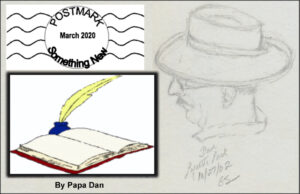
“Live long and prosper.”
“Logic is the beginning of wisdom,
not the end.”
— Mr. Spock
To download a PDF of this post, click here: ConVivio.Vulcan_Salute
===========================================================
The Vulcan Salute

During the days when “Star Trek” was a popular TV show, Mr. Spock (Lieutenant Commander and Science Office of the Starship Enterprise) taught us the Vulcan Salute. In language, it translates to “Live long and prosper.” It was a friendly, respectful greeting that those of us from the 21st century might use in a way similar to our human handshake. So, given today’s reluctance to shake hands for sanitary reasons, it might be used to become a germ-resistant cultural replacement for that time-honored gesture.
Considering the source, Mr. Spock (played by actor Leonard Nimoy) had a dramatic backstory — he had a mixed Human-Vulcan heritage, he taught a number of respectful behaviors to his human colleagues. The character’s father was named Sarek, from the planet Vulcan, and his mother was Amanda Grayson, a human. Due to his mixed-race heritage, the young Spock character had a difficult childhood, bullied on his home planet by full-blooded Vulcan children who made fun of the human emotions he inherited from his human mother. He grew up alongside his half-brother, Sybok, who was eventually cast out for rejecting logic. Although Spock was accepted in the Vulcan Science Academy, he did not enter the academy because they would never fully accept someone who was only half Vulcan. Instead, he succeeded in entering Starfleet, while spending the next 18 years estrange from his Vulcan relatives.
The evolution of the character was interesting in that the network wasn’t pleased with the mixed-race feature of the character and often airbrushed out the pointed ears of the character in promotional photos. After the first season, a rift grew between the show’s creator, Gene Roddenberry, and Nimoy because the writing of the character deteriorated into brief expressions of “fascinating” and “logical”; and more complex interactions of the character with other characters, focusing on his unique racial heritage, were rejected by the network. However, the Vulcan Salute in today’s environment has a number of useful qualities to offer to us 21st-century humans.
Many aspects of Spock’s character endured in popular culture and the boundary between the character and the actor was eventually blurred and then erased. The character was adopted as an informal mascot by NASA and was incorporated into a number of literary successes by authors like Isaac Asimov. An asteroid was named Mr. Spock in 1971 and the character, further promoted by Mr. Nimoy, became an inspiration to a number of scientists and engineers along with a number of more recent honors:
- In 2004, Spock was ranked number 21 in Bravo’s list of The 100 Greatest TV Characters. According to Wlliam Shatner, the other star of the series, “much of the acting praise and media interest in the show went to Nimoy.”
• In 2008, Unified Gamers Online Inc. (UGO) named Spock one of the 50 greatest TV characters for both the original series and subsequent movie appearances.
• In 2012, Imagine Games Network (IGN) ranked the character Spock as the second top character of the Star Trek universe, with Kirk in the top spot.
• In 2016, Adam Nimoy released his very popular documentary film For the Love of Spock, about his father and his iconic character.
• Spock (Nimoy) has been honored by a multitude of film and television institutions for his dominant role among the characters of the Star Trek franchise over fifty years, from the original pilot in 1964 to his final film performance in 2013.
• After the death of Leonard Nimoy in 2015, there has been an increase in the practice of altering the portrait of Canada’s seventh prime minister, Wilfrid Laurier, on Canada’s five-dollar note to look like Spock.
For today, if we all begin promoting the Vulcan Salute as the clinically safe and respectful greeting to replace the handshake, it may actually have a positive impact on reducing the spread of the coronavirus here in the twenty-first century.

Why don’t we give it a try? (Can you do it?)
Finally, at this difficult time in our human history, I am reminded of some words — once used in a movie but originally attributed to John Lennon. He said:
‘“Everything will turn out alright in the end.
If it is not alright, it is not yet the end.”
![]()
Beautiful Words — A Challenge
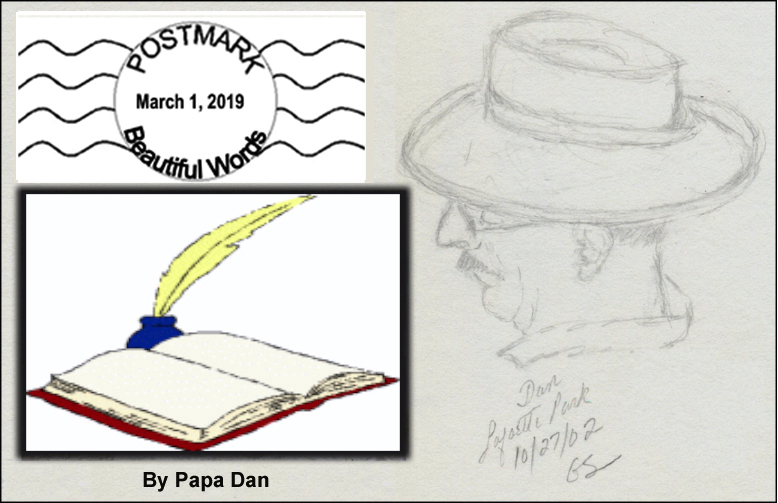
“To a first approximation,
words mean what they say.
…
AND how they make you feel.”
Click here to download a PDF of this story:
= = = = = = = = = = = = = = = = = = = = = = = = = = = = = = = = = = = = = = = = = =
Recently,
a ‘by-line’ in the San Francisco Chronicle got my attention. What caught my eye was not the title, but the
author’s name — Nick Hoppe. Frankly, I
had not heard of “Nick” Hoppe, but his last name, “Hoppe,” is a name that had
been important to me for half a century.
Art Hoppe, who turns out to be
Nick’s dad, was a columnist at the Chronicle from 1960 until his death in
2000. The column was called “Our Man
Hoppe” and later “The Innocent Bystander,” at its peak syndicated by over 100
newspapers nationwide. His satirical
column covered local and national politics and included essays, feature columns,
and one-act scenes with an ongoing cast of characters like Private Oliver Drab,
Joe Sikspak, Homer T. Pettibone, and others.
Art Hoppe was my hero. I read his five-day-a-week column starting in the 7th grade and, when I determined that I wanted to be a writer, he was my inspiration. Much of what I have done on convivio-online.net is inspired by him. One in particular is a one-act play I posted on ConVivio in 2011 in which I recreated two characters he featured often over the years — Gabriel and The Landlord — my version is called “Some Explaining To Do” (click here if you’d like to read it).
–> –> –>–> But I digress … all of that explains what attracted me to Nick Hoppe’s column earlier this month called, “Words That Just Feel Good On the Tongue.” His goals were to identify ten words that, according to him, were the ten most beautiful words in the English language and explain why they were beautiful TO HIM. I thought that was an intriguing idea. When I read his column (and his list), I decided that many of his choices were NOT among those I would choose (e.g., his #1 choice was “knucklehead”). BUT, I quickly realized that was his point: that I should identify words that I thought were beautiful and defend what made them important TO ME.
So, I Made a List
I
tried to create a list and a brief defense of each word’s presence on my
list. I decided a word earned the right
to be included with a combination of the sound of the word and its meaning —
the composite of how that word makes me feel.
It was sorta fun, but as with most lists of “favorites,” the challenge
is to decide what must be excluded. Turns
out, I just plain failed to limit my list to ten, as Nick Hoppe had done (so,
sue me). Below is the result:
A. My list of the top-ten most beautiful words in American English (according
to me)
B. My list of the second-ten most beautiful words in American English
C. A list of beautiful words I’ve stumbled across in other languages that SHOULD
be in American English, but we don’t seem to have an equivalent word.
Observation: few one-syllable words made the list. Following the Italian pattern, d’yathink words with multiple pronounced vowels sound more melodious, and generate stronger feelings?
A CHALLENGE —> Since you will inevitably disagree with some of my choices, (I can hear you now: “How could you possibly include THAT word?”), I INVITE YOU to make our own list(s) and defend your choices. If you send me a list (or even just suggest a word or two), I will publish them here, if you like (with or without your name, as you choose).
My Top Ten Most Beautiful Words in American English, and why they are beautiful (listed here alphabetically)
1. Becoming — this word (the title of Michelle Obama’s wonderful book) sets aside the notion that we must end up somewhere “final” in this life. It suggests that we can always be more.
2. Grace — I admire this word with its three meanings: for many, a spiritual condition (“a state of grace”) received as an unearned divine gift; it is also a description of the physical elegance of artistic movement (as in a graceful dancer); but also, as a verb, to confer dignity or honor to a place or event. (“I do not understand the mystery of grace only that it meets us where we are but does not leave us where it found us.” — Anne Lamott )
3. Love — the starting point and sustenance of everything good; either with a specific target or a broad, generalized intent toward all of life. It comes to us free and is re-distributed free.
4. Kindness — the quality of being friendly, generous, considerate, without expecting a reward.
5. Serendipity — occurrence of happy or beneficial events apparently by chance (“Hitting the center of a target you didn’t know you were aiming at.” — Bujold
6. Simplicity — uncomplicated, easy to understand effortlessly, uncluttered.
“Everything should he made as simple as possible, but not simpler.” — Einstein
“Simplicity, simplicity, simplicity.” — H.D Thoreau (essential ingredient of a good life)
7. Storytelling –>–> One of my favorite words.
“Storytelling reveals meaning without committing the error of defining it.” — Hannah Arendt
“Stories are the common currency of humanity” — Tahir Shah (Arabian Nights)
“The human species thinks in metaphors and learns through stories.” — Mary Bateson
“Reality can be beaten with enough imagination.” — Mark Twain
8. Welcome — an invitation bestowed on another person that says: “You belong here. Come in.”
9. Wonderful — inspiring delight, worthy of admiration, stimulating imagination (i.e., wonder)
10. Yosemite (Yohhe’meti) — name of the tribe that occupied what is now the Yosemite Valley, named by the surrounding, more peaceful Miwok tribes (literal translation: “Those who kill”).
That tribe called themselves the Ahwahneechee and named “their” valley “Ahwahnee.” The Miwok translation for “Ahwahnee” meant simply “people. Archaeological evidence of the Ahwahnechee and the name date back about 800 years. Early recorded contact with European settlers was about 1850 during the Gold Rush. The name “Yosemite” stuck after being named that by 18th-century European settlers. –> –>My love of this word does not stem from its troubled linguistic history but from our own experience with this beautiful, inspiring valley over our lifetime AND the inspiring sound of the word.
My Second Ten Most Beautiful Words in American English
11. Eloquence — fluent or persuasive speaking or writing. à And I enjoy the sound of this word.
“You must speak straight so that your words may go as sunlight straight into our hearts.” — Cochise
“Eloquence is painted thought.” — Blaise Pascal
12. Ephemeral — lasting for a short time, fleeting. “She liked the way the word sounded in her head. ‘I am ephemeral.’ It made her feel like something passing and precious.” — Pamela Todd
13. Exhilaration — synonyms: elation, euphoria, joy, ecstasy, exultation, rhapsody.
“Exhilaration is that feeling you get just after a great idea hits you and just before you realize what’s wrong with it.“ — Rex Harrison. “We can take some gratification at having come so far in just a few thousand years as language users but it should be a deeper exhilaration to recognize that we have such a distance to go.” – Lewis Thomas
14. Felicity — joy, delight, cheerfulness, ability to express one’s thoughts effectively.
“To strive with difficulties and to conquer them is the highest human felicity.” Samuel Johnson
“There is more felicity on the far side of baldness than young men can possible imagine.” — LP Smith
15. Forbearance — patient self-control, restraint, tolerance.
“Common man’s patience will bring him more happiness than common man’s power.” Amit Kalantri
“Leadership was not an act of bravery but rather forbearance and the strength to move forward with humility in the belief of what is right.” Sortoosh Shahrivar
16. Mellifluous — voice or words sweet or musical, pleasant to hear. “In my dreams, I heard your mellifluous voice. It slowly woke me up from a deep sleep so that I could enjoy the magnificence of life.” — Debasish Mridha
17. Propinquity — proximity à I just like the sound of it better than mere “proximity.”
“Keep characters in propinquity long enough and a story will always develop a plot.” — Keith Miller
18. Quintessential — classic, representing the most perfect example of a quality.
“A quintessential experience is to hike up the John Muir Trail behind the Mist Trail to the top of Vernal Falls and trudge through the snow to the rock from which you can look down at Vernal and up at Nevada Falls — and, if you are not eaten by bears in the dark on the way down, to have a glass of Rombauer Chardonnay in the Ahwahnee dining room with a plate of scallops.” — PapDan
19. Resplendent — attractive and impressive through being richly colorful or sumptuous.
20. Succulent — OK so I just like the Hemingway quote à“As I ate the oysters with their strong taste of the sea and their faint metallic taste that the cold white wine washed away leaving only the sea taste and the succulent texture, and as I drank their cold liquid from each shell and washed it down with the crisp taste of the wine, I lost the empty feeling and began to be happy and to make plans.” — Ernest Hemingway
Ten Words with no English Equivalents, that the English Language Needs
–> –> Some emphasis here on the sound of these words, as well as their meaning.
1. Flaneur (French) — a person at leisure, deliberately aimless, wandering streets, soaking in a city, a neighborhood, or, heck, a forest.
2. Magari (Italian) — “If only”; use this for beautiful experiences that you wish for, longingly.
3. Metanoia (Greek) — the journey of changing one’s mind, heart, self, or way of life.
4. Mudita (Sanskrit) — taking delight in the happiness of others.
5. Namaste (Sanskrit) — traditional Hindi greeting or gesture of respect, (“I bow to the divine in you”) by holding the palms together before the face or chest and bowing. The gesture is called a “Namaskar”; the word used is “Namaste.” àà Gretta contributed this one to the list.
6. Passeggiata (Italian) — a slow, late afternoon or evening stroll, (perhaps associated with gelato). This is a close relative of the French word “Flaneurie,” which is what a Flaneur does.
7. Rocambolesco (Italian) — a person who is daring, adventurous, and incredible — or an experience that can be described with one of those adjectives.
8. Sprezzatura (Italian) — to do something flawlessly, effortlessly, splendidly.
9. Tickety-boo (British) — Something satisfactory and in good order (but not extraordinary); sometimes shortened to “twee.” Some believe it derives from Hindi “ṭhīk hai, bābū,” meaning “it’s alright, sir” — and is therefore a linguistic theft.
10. Tsundoku (Japanese) — the act of buying books, keeping them, and not reading them
Afterthoughts — A few of you sent in your own lists of carefully-selected words as comments on ConVivio. I have taken three of those lists from “Comments” and added them below — they are from
1. Our own famous “Hat Lady”
2. Our guest poet Lauren de Vore
3. Overall wise-word-man Stephen Faletti.
I think you will enjoy their contributions.
Nick Hoppe’s recent column (with his top-ten list) can be found here: https://www.sfchronicle.com/entertainment/article/Words-that-just-feel-good-on-the-tongue-13607480.php?cmpid=gsa-sfgate-result
If you’re interested in knowing more about my earliest writing hero, Art Hoppe, his obituary in the Chronicle from February 3, 2000, paints a good picture. It can be found here: https://www.sfgate.com/news/article/Chronicle-Columnist-Art-Hoppe-Dies-Eloquent-3240505.php
“The Hat Lady‘s” Lists of Favorite Words
Our famous “Hat Lady” offered two lists and a bit of a “defense” for including each word — in some cases identifying a word that needs to be used more often in our public discourse and placing that word within her own personal philosophy. Shortly after her 90th birthday, she says: “I just have one defense of my lists. The words are good. They lend variety to expression, a precision, or shading. These are all things that the English language does well.”
My First List
- Story — Narrative, true or fictitious, designed to interest or muse the hearer of the reader. Everyone has a story to tell, if only one would stop to listen or read.
- Equanimity — Easiness of mind or temper; calmness, composure. Disturbing one’s equanimity these days is easily done. One must reach for it again and again.
- Façade — Face or front of a structure; an outward appearance maintained to conceal a less pleasant disposition. It’s always rewarding to present a sunny demeanor.
- Embrace — to take on or receive an idea gladly; to avail oneself of opportunity; to include. To embrace the concept of respect for all does not appear to be publicly appealing at this time.
- Consequential — the nature of consequence following an effort or result. Consequential implications of one’s actions are mostly ignored these days. What a shame!
- Accommodate — to do a kindness of a favor for friends, family, or even a stranger. How could one not accommodate someone in need, whatever the need might be.
- Meander — to proceed by a winding course; to wander aimlessly. It does one good to meander through fields in Spring. It is also good to let thoughts meander once in a while.
- Curmudgeon — irascible; churlish; sometimes lovable. A little patience with this recently elder person can be fun.
- Thanksgiving (Day) — The act of giving thanks on a special day. There is much joy in assembling loved ones and making preparations for a festive day of thanks.
- Affirm — to state positively as true; assuring that one’s belief and/or loyalty can be accepted without doubt.
My Second List
- Ingenious — showing cleverness; inventiveness; free from reserve; frankly candid.
- Conundrum — Anything which puzzles; not easily resolved. The world itself is a puzzle. Its origin is not known.
- Sublime — Inspiring the mind with some sense of grandness; awe-inspiring.
- Limpid — transparent; crystal clear.
- Insight — a penetrating mental view; sudden grappling with a solution.
- Probity — integrity; up-rightness; honesty.
- Optimist — a person given to looking on the bright side; a belief in goodness.
- Gingerly — with caution or extreme care; mincingly; daintily.
- Imbroglio — a perplexing situation; complicated or difficult to resolve; a laughable mix-up (it’s Italian).
- Fragrance — having a pleasant odor, as in the fragrance of Spring; ripening fruit; homemade bread.
Lauren de Vore’s Words that “roll off the tongue and into the ear most pleasantly.”
On February 28, 2019, Lauren wrote: “These are not necessarily my “favorite” words; those words have all sorts of connotations and associations, making it difficult to judge them solely on the basis of their sound. The ten words offered below (in no particular order) are those that, to my mind, roll off the tongue and into the ear most pleasantly.”
- Amble: slow and easy, it moseys through the mouth and out into the world.
- Cherish: there’s something precious and precise about “cherish”; doesn’t hurt that there’s a rather nice song with this title.
- Bell: the initial “b” is the clapper that strikes the lips and opens up the mouth for a big, round, resonant “ell.”
- Eiderdown: just sigh into the word and feel it settle softly over you.
- Nosh: voiced directly behind the nose, nosh is a silly word but so much more satisfying than snack.
- Tourmaline: sparkles like crystalline but with more color and depth, just like the gem.
- Dreamy: flows with great mouthfeel, just like soft-serve ice cream but without the calories.
- Palisade: never mind the meaning, I just like the way it glides (glissades?) off the tongue.
- Velvet: I love the way the word sounds the way velvet feels, especially when you savor the “ell.”
- Golden: so rich and warm, if a sound could glow …
Stephen Faletti’s Words
On March 6, 2019, Stephen offered this list:
- AAUGH! — an exclamation used when characters in the Peanuts comic strip scream. When yelled, the characters are typically facing up with their mouths almost as big as their faces.
- AAARRRGGGHHH!!! — a longer exclamation related to AAUGH!
- Asymptote — a straight line such that the distance between some curve and the line approaches zero as the x or y coordinate tends to infinity (in analytic geometry). So the curve continually approaches but never quite touches the line (meets without touching). From the Greek root asymptotos meaning “not falling together.” See the classic curve y=1/x. For extra credit, see the hyperbola x^2-y^2=1.
- Spectacular — beautiful in a dramatic and eye-catching way. Use with the special intonation made famous by Huell Howser in the PBS television series “California’s Gold,” as in spec-TAC-ular. Try it out loud.
- Disgruntled — angry, dissatisfied, or discontented. You can hear the grumbling when you say the word. From an old verb gruntle meaning “to utter little grunts,” with the prefix “dis” used as an amplifier not an opposite (no one is ever gruntled).
- Homoscedasticity — same variance (in statistics). The situation in linear regression analysis where the variance (random noise) around the regression line is the same for all values of the variable x. So the data points in the scatter diagram are all roughly the same distance from the regression line. But who cares? Just enjoy pronouncing this 7-syllable word.
- Heteroscedasticity — different variance (complement to homoscedasticity). An 8-syllable word that has a delightful sing-song intonation.
- Old-School — characteristic or evocative of an earlier or original style, manner, or form. Use with appreciation or reverence, not as a pejorative.
- Emphatic — expressing something forcibly and clearly; showing or giving emphasis. This word sounds like its definition.
- Tort Litigation — I’m breaking the rules of the exercise here by using a phrase instead of a word. But you might enjoy the effect of saying these two words emphatically, out loud, and together as if they comprised a single word. Try it.
My 10 Words – Lewis Bell
Understanding – This is a big one, because it seems that when people reach a point of great authority they lose the ability to understand anything other than their own ego driven desires. The world is full of misunderstanding now. I don’t know if it is more or less than usual, but I only live in what is now. All of it is hard to understand but every day I try to understand and do the right thing.
Satisfaction – My father once told me that, “A satisfied man is a happy man.” He didn’t tell me much because he died when I was 13, but those words have always stuck with me. I agree with him. All you need is all you need. You don’t have to have it all, just what it takes.
Delight – Those perfectly timed moments that bring glee, relish, excitement, thrill, happiness. Babies, puppies and kittens are especially good at it. It keeps you young❣️
Compassion – Caring for your fellow man and setting the good example for those that follow you to do the right thing. Success does not always mean getting. Giving can bring greater wealth. When it is your turn, do not look the other way
Devotion – Belonging to and having someone belong to you builds amazing foundations and creates a steadfastness that can and will last for an eternity.
Laughter – This one tops the list – “Love, Live Laugh” is plastered all over my being. “If you can’t laugh about it, it is not worth doing.” Don’t know who said that, but Milton Berle said, “Laughter is an instant vacation.”
Faith – Not so much in a deity or an organized religion, but more so faith in myself – knowing that I can get the job done, knowing that I have what it takes, an inner strength, a positive sense of being.
Creativity – I thrive on creativity. Most recently I have discovered hidden talent is graphic arts and in music. Making something from nothing but yourself is so powerfully rewarding.
Awareness – Always being acutely aware of where I am and what is going on around me – not because of being afraid, but of being fearful that I will miss out on something in this amazing world in which we live. I can’t tell you how many times I have asked someone, “Did you see that?” And they answer, “No.” And I think, “Your loss!” It doesn’t cost anything to pay attention.
Individualism – I’ve always strived to be self-motivated, self-supporting, and not afraid of being different. I am my own person. I have those that I love and those that I follow, but I am not into group pressures. I like to make up my own mind.

Show likes.
Chasing the Shade
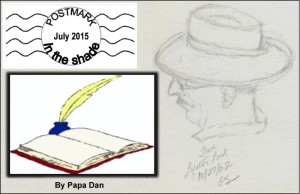 I am sitting at my desk staring at the tip of my fountain pen, hoping for some inspiration; but the words are not coming — not an unfamiliar experience for me. Ideas, of course, come and go in various stages of completeness, sometimes stimulated by world events, other times from personal experience or reading, and most often from observing other people.
I am sitting at my desk staring at the tip of my fountain pen, hoping for some inspiration; but the words are not coming — not an unfamiliar experience for me. Ideas, of course, come and go in various stages of completeness, sometimes stimulated by world events, other times from personal experience or reading, and most often from observing other people.
Among those ‘other people,’ I have had the privilege of being exposed to some terrific writers over the course of my lifelong education, people like Wilder and Poe, Hemingway and Fitzgerald, Steinbeck and Twain, Frost and DeVore. Some of them made a habit of offering advice to other writers. So, at times of ‘drought’ like these, I’ve dutifully looked to them for guidance.
Staring again at the tip of this fountain pen trying to write my own story, I find that those writers offer a wealth of advice that sometimes seems to be aimed directly at me. Hemingway, the writing teacher I will quote today, is particularly generous with what sounds at first like such simple advice. He compares himself to other writers to provide guidance on the use of language: “Poor Faulkner – does he really think big emotions come from big words? He thinks I don’t know the ten-dollar words. I know them, alright, but there are older and simpler and better words, and those are the ones I use.” That sounds reassuring: use simple words, tell simple stories about real people.
But then, sometimes he can also be a powerfully intimidating teacher of what it takes to be a writer. “All good books,” he wrote, “are alike in that they are truer than if they had really happened; and, after you are finished reading one, you will feel that all that happened to you and afterwards, it all belongs to you; the good and the bad, the ecstasy and the remorse and sorrow, the people and the places, and how the weather was. If you can get so that you can give that to people, then you are a writer.”
Oh. That’s what I have to do?! Can I do that? Seems like such a tall order! At least I can emulate his occasional use of long sentences.
I think he tried to be comforting with simpler advice when he wrote: “The most essential gift for a good writer is a built-in, shock-proof shit detector. This is the writer’s radar and all the great writers have had it.” And then, he offers more comfort: “I write one page of masterpiece to ninety-one pages of shit. I try to put the shit in the wastebasket.”
And then, he provides specific guidance from his own process: “Write drunk. Edit sober.”
Having gotten the specific advice out of the way, I look for examples to imitate and I find one – simple instructions for improving one’s mood, again from Hemingway, no shit for the wastebasket, strung together into a single long sentence:
“As I ate the oysters with their strong taste of the sea and their faint metallic taste that the cold white wine washed away leaving only the sea taste and the succulent texture, and as I drank their cold liquid from each shell and washed it down with the crisp taste of the wine, I lost the empty feeling and began to be happy and to make plans.”
From the small and simple details of taste and texture can come powerful feelings that can make a difference. Hemingway sneaks up on you. I look up from his words and say to myself. “I could have written that.” But I stare at the fountain pen and acknowledge the equally simple truth: ”But I didn’t.”
Staring again at the tip of my fountain pen, my mind wanders from Hemingway’s sentence to two simpler, shorter, and more powerful sentences than anything I could have written. These came from two friends of mine, both of whom have been fighting cancer – one for a short time, one for a long time. Katie had shared her feelings in an email shortly after her diagnosis. She wrote about her attempt to bring back the comfort of the time before the cancer. She described an afternoon in the backyard with a task that seemed simple — walk out to the Adirondack chair and sit in the shade with a book and a glass of cold chardonnay. Seeking comfort in the backyard turned out to be a search for a respite from too much of even a good thing like sunshine. A few feet away a lemon tree was providing shade; so the next task was to seek the protection of the stationary tree from the glare of the sun.
As she positions the chair under the tree and gets comfortable in its shade, it didn’t take long to confront the illusion. The shade seemed stationary; and yet, in the words of Galileo (as an apology for having saved himself by denying the truth) “eppur si muove” “and yet it moves.”
We always seem to seek that illusion of permanence, don’t we — that the sunshine or the shade, whichever we prefer at the moment, will stay put, right where we want it? After some experience, we know better, don’t we? Is it merely the subconscious hope that something comfortable, stable, and safe, can be captured and held close to us? Maybe we eventually learn that growing up is the act of admitting to ourselves, and accepting, that everything in the universe, everything in the world, everything in ourselves, is moving. After that ‘simple’ observation, we try to anticipate that motion and move the chair to the place where the shade will end up, and we experience the further truth that nothing really moves in a straight line.
Damn. It was looking simple there for a while.
And then, there’s my oldest friend Lew. We met in the dorm at Santa Clara University in 1968 and I have watched him fight cancer for years in one successful battle after another, and then again more recently, leading to a series of treatments that concluded just before flying off to Europe for our long-planned vacation to Italy and France. On the train in Italy, Lew, his wife Rita, and Gretta and I joked that Italian food and French wine were probably the most powerful weapons he could wield against the disease. It was a great trip: the sweetness of Varenna on Lake Como, the bright warm sunshine of the French Riviera, and the calm pastoral setting of the wine country of Provence – a series of ‘treatments’ as healing as anything one could imagine.
Now for the simple, powerful sentences I promised —
A few days after returning to California came the lab tests and an appointment with the doctor to learn how effective the treatments had been. And our phone rang. It was Lew with as simple and powerful a sentence as anything Hemingway might have written: “My PSA is zero and they can’t find cancer anywhere in my body.”
Back to Katie in the Adirondack chair, after getting test results from her doctor, it became simple once again. “There’s news,” she wrote, “I’m clean; I’m clean.”
And now, with all of us back in the shade once again, I’m ready to put the pen to the paper …
Download a PDF of this post: Chasing_The_Shade_ConVivio_July22_2015
Words Are Dropping Out of the Language like . . .
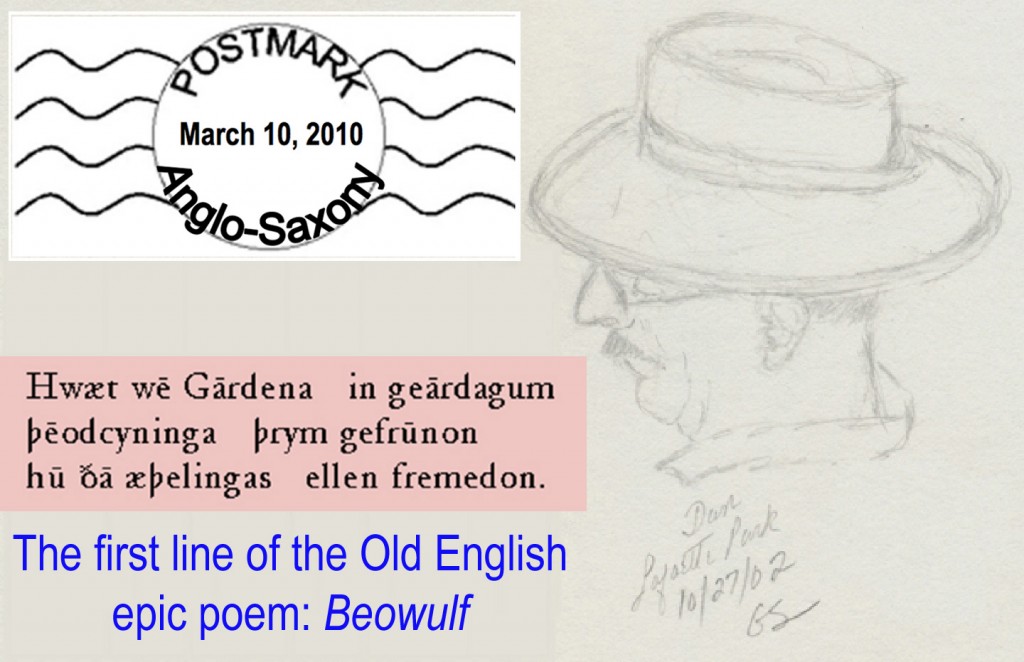 It doesn’t take a literary scholar to notice that the English language has changed a lot over its lifetime. The ‘Old English’ of the 11th century is quite unrecognizable to us moderns. It’s hard to believe it’s ‘English.’ (Click to listen to the first line of the Old English epic poem Beowulf).
It doesn’t take a literary scholar to notice that the English language has changed a lot over its lifetime. The ‘Old English’ of the 11th century is quite unrecognizable to us moderns. It’s hard to believe it’s ‘English.’ (Click to listen to the first line of the Old English epic poem Beowulf).
By the time the language evolved to ‘Middle English’ through the 12th-15th centuries, it started to look and sound a bit more familiar to us; but it still had a decidedly foreign sound to our modern ears. (Click for a little Chaucer.) Eventually, the so-called ‘Chancery Standard’ of the 1470s led the way to the Elizabethan English we recognize in Shakespeare. (Romeo & Juliet at the balcony)
We tend to think of the 400 years from Shakespeare to John Lennon as a long stable period of standardization. However, as I near the end of my sixth decade speaking this language, I am noticing that many words and phrases that I grew up with have been dropping out of the language. Some have been replaced with new ones created with the help of the scientific and cultural innovation that has exploded during my lifetime. Others have just dropped off the wagon to be crushed under the wheels of 21st-century multimedia (ouch!). These changes in our language certainly demonstrate the forces that have shaped our language through its long and varied history. A few examples of verbal the casualties from my youth serve to illustrate —
Since our fascination with automobiles dominated popular American culture in the 1950s, the language reflected that reality. How many of you remember ‘fender skirts?’ These popular add-ons were a luxury item for several automobile models.
All of my dad’s cars had ‘curb feelers’ in the 1950s and 60s, and the sound they made scraping against the curb was the sound we all associated with the arrival of a car in front of our house. A familiar status symbol I associated with ‘cool’ was the ‘steering knob.’ Some called them ‘Necker’s knobs’ because they allowed a young man to steer with one hand while ‘necking’ (when’s the last time you heard that word) with the girl beside him. Fortunately, ‘steering knobs’ went out of favor for reasons illustrated by their more pejorative name: ‘suicide knobs.’ So, these words left the language as automobile fashion and technology left these devices behind.
When are we going to stop referring to ’emergency brakes’ — perhaps when more of us realize that they were of little use in a real emergency and, as ‘parking brakes,’ their value is actually to prevent emergencies. ‘Continental Kits’ were a symbol of faux luxury hanging off the back of a car that was otherwise not a Lincoln Continental.
How many of you remember that headlight high-beams were activated with ‘dimmer switches’ located on the floor to the left of the clutch? (And how many of us are beginning to forget what a clutch does?) Did you have a car with a ‘spoiler’ in the 60s? How about glass packs? Again, these words are either gone or on their way out.
Our language has off-loaded a number of other words beyond the language of automobiles. When was ‘supper’ replaced by ‘dinner’ — perhaps it was about the time the verb ‘to sup’ was replaced with the verb ‘to dine?’ Do you remember when a ‘store-bought’ dress or ‘store-bought’ cookies were considered luxuries back when so many items of food and clothing were manufactured by moms? Today, nobody calls attention to the fact that anything is ‘store-bought.’ And I still remember how proud my parents were when they covered up their hardwood floors with new ‘wall-to-wall carpets,’ which were a status symbol in the 1950s. I find that especially fascinating as Gretta and I prepare to have our own carpets removed next week and replaced with hardwood floors. As we discuss that plan, I haven’t heard anyone use the term ‘wall-to-wall.’
I had a ‘percolator’ in my dormitory room in 1968. When was that last time you heard that word?  By the time I graduated in 1972, I had all but heard the last of it. (More trivia: does anyone remember the name of the spokesman who starred in the Mr. Coffee commercials that ended the reign of percolators and introduced the term ‘coffee maker’ to the language?) Similarly, my Dad had a ‘Hi-Fi’ that played all of his records when I was a kid. By the time I needed one of my own, the word ‘stereo’ had taken over. While the word ‘turntable’ seems to be surviving (at least as long as vinyl records remain collectibles), but how many people in our more recent generations remember the technological origin of the word ‘groovy’ — even if they still hear their elders use that silly word? Do you still use the word ‘album’ to refer to a recording with more than two songs on it? Or do you use the word ‘LP?’ My Dad used to call them ’33s’ and ’78s.’ (I still have some of my old ’45s.’) There is extra credit for anyone who can tell us what an EP was. I bought one produced by the Beatles in 1964.
By the time I graduated in 1972, I had all but heard the last of it. (More trivia: does anyone remember the name of the spokesman who starred in the Mr. Coffee commercials that ended the reign of percolators and introduced the term ‘coffee maker’ to the language?) Similarly, my Dad had a ‘Hi-Fi’ that played all of his records when I was a kid. By the time I needed one of my own, the word ‘stereo’ had taken over. While the word ‘turntable’ seems to be surviving (at least as long as vinyl records remain collectibles), but how many people in our more recent generations remember the technological origin of the word ‘groovy’ — even if they still hear their elders use that silly word? Do you still use the word ‘album’ to refer to a recording with more than two songs on it? Or do you use the word ‘LP?’ My Dad used to call them ’33s’ and ’78s.’ (I still have some of my old ’45s.’) There is extra credit for anyone who can tell us what an EP was. I bought one produced by the Beatles in 1964.
Did anyone notice when we stopped using the word ‘brassiere’ and the word ‘bra’ became the norm? Not long before that, I remember hearing my parents refer to underwear as ‘unmentionables’ in mixed company. ‘Pregnant’ was considered too graphic or clinical — certainly for TV. Do you remember when the expression “in a family way’ was the proper euphemism? When was the last time you heard that expression?
Can you think of other words that have begun to drop out of our language? Are there sports terms that have disappeared from the lexicon? (‘Basket catch?’, ‘pine tar?’) Have we lost any movie vocabulary? (Do people still go to see ‘flicks?” Have you heard the word ‘Celluloid’ in the last decade or so?) Words associated with politics? Books? Television? (Do they still have ‘test patterns’ very late at night?)
Here’s a ‘lost-word’ trivia question: Can anyone explain the clever play on words — including a word we don’t use anymore — that John Lennon was using in the title of a book of nonsense stories and drawings he published in 1965 called A Spaniard in the Works? No fair looking it up [oh, go ahead, you won’t get it otherwise].
What other verbal casualties can you think of?
Ain’t Goin’ Down Easy
Of course, the rules of usage and grammar are the hardest to change. For some reason, people get offended when other people begin neglecting or bending the rules of grammar or usage. Can you think of some examples of trends that are meeting resistance as our language attempts to change? Send us a comment. Is your language changing? I, of course, am resisting it.